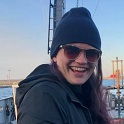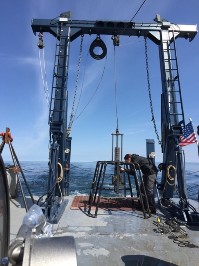
I am a PhD student working in Dr. Susan Lang’s lab. My project focuses on changes to carbon-based organic matter in water as it moves through the oceanic crust in places like hydrothermal vents. Hydrothermal vents have been proposed by some to be the cradle of life, where inanimate molecules came together and created the first cells, due to the unique heat and chemistry that occurs at vents. Studying these changes in organic matter may lead to answers about the first forms of life on our planet, and gives us the ability to study conditions on other planets with hydrothermal activity that may give rise to extraterrestrial life.
Before coming to University of South Carolina, I graduated with a Master’s degree in Chemistry and Biochemistry from the University of Minnesota, and had the opportunity to work on Lake Superior. Working on a research vessel caused me to fall in love with my samples in a way that I hadn’t experienced before, and a career that allows me to do field work and tinker away in a lab appeals to me. After researching and interviewing multiple possible PhD advisors, I came on the campus visit to University of South Carolina, and came away with an excellent impression of the School of Earth, Ocean, and Environment. The faculty and professors that I met were personable, enthusiastic, and committed to growth in educational practices in STEM, as well as being excellent scientists. I remember in particular spirited and exciting one-on-one talks with multiple professors about how the department was working to increase the diversity within its programs. I was impressed with the department, and decided that I wanted to learn to be a professional scientist and researcher at the School of Earth, Ocean, and Environment at USC. After graduating from University of South Carolina, I plan to pursue a postdoc – ideally in Scandinavia, definitely abroad. At this point in my career, I’m unsure as to what exactly my role in academia will be, but I do know that I want to continue teaching and mentoring young scientists, going on research cruises, and tinkering in labs.
One of my dreams for my research is to study extreme environments and bodies of water with unique chemistry. I am particularly fascinated with how life (microbes) responds to and survives wildly drastic changes in chemistry, and so some of my dream places to study are (besides hydrothermal vents) volcanic lakes and subglacial Antarctic lakes. Volcanic lakes can have pHs so extreme that nothing can live directly in them, but microbes living on the edges can survive the deadly fumes that kill any other form of life that comes near. Some subglacial Antarctic lakes have been closed off to the atmosphere for hundreds of thousands of years, but researchers have found microbes there, living off of cycling and recycling the same nutrients that whole time. Life and its chemistry is fascinating, so I hope to be part of a generation of researchers that brings new knowledge to those strange parts of the world.
